Aeschylus Quotes - Page 12

Aeschylus (1956). “Aeschylus: The suppliant maidens, The Persians, translated by S. G. Benardete. Seven against Thebes, Prometheus bound, translated by D. Grene”
Aeschylus (1868). “The Tragedies of Aeschylos: The Persians. The seven who fought against Thebes. Prometheus bound. The suppliants. Fragments. Appendix of rhymed choruses”, p.233
Aeschylus (1964). “The Libation Bearers: And The Eumenides: The Oresteia, Parts II and III.”
For in pure maidens, knowing not the marriage-bed, the glance of the eyes sinks from shame.
Aeschylus (2013). “Delphi Complete Works of Aeschylus (Illustrated)”, p.391, Delphi Classics
Aeschylus (2013). “Aeschylus I: The Persians, The Seven Against Thebes, The Suppliant Maidens, Prometheus Bound”, p.89, University of Chicago Press
Aeschylus, Sophocles, Euripides (1958). “The Complete Greek Tragedies: Aeschylus”
But still the block of Vengeance firm doth stand, and Fate, as swordsmith, hammers blow on blow.
Aeschylus (1873). “The Tragedies of Æschylos: A New Translation, with a Biographical Essay, and an Appendix of Rhymed Choral Odes”, p.370
Sophocles, Aeschylus, Euripides, Aristophanes, Robert Whitelaw (1938). “Ten Greek Plays”
"Agamemnon". Play by Æschylus, line 185. "Hoyt's New Cyclopedia Of Practical Quotations", 1922.
Still to the sufferer comes, as due from God, a glory that to suffering owes its birth.
Aeschylus (1873). “The Tragedies of Æschylos: A New Translation, with a Biographical Essay, and an Appendix of Rhymed Choral Odes”, p.343
For a deadly blow let him pay with a deadly blow: it is for him who has done a deed to suffer.
"The Libation Bearers". Play by Aeschylus,
Unjustly men hate death, which is the greatest defence against their many ills.
Aeschylus (2013). “Delphi Complete Works of Aeschylus (Illustrated)”, p.412, Delphi Classics
Aeschylus (1964). “The Libation Bearers: And The Eumenides: The Oresteia, Parts II and III.”
Jars neither of wine nor of water shall fail in the houses of the rich.
Aeschylus (2013). “Delphi Complete Works of Aeschylus (Illustrated)”, p.344, Delphi Classics
Aeschylus (2013). “Aeschylus II: The Oresteia”, p.66, University of Chicago Press
Aeschylus (2013). “Aeschylus II: The Oresteia”, p.23, University of Chicago Press
God planteth in mortal men the cause of sin whensoever he wills utterly to destroy a house.
Aeschylus (2013). “Delphi Complete Works of Aeschylus (Illustrated)”, p.362, Delphi Classics






